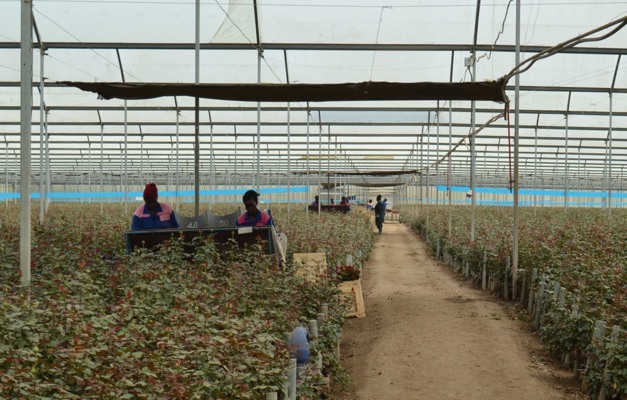A company's environmental and social responsibility is becoming increasingly important. As a result, demand for certificates is higher and more and more growers are applying for them. Some of them even go a step further. Kenyan rose farm Maridadi, for example, got their crop below the MRL standard applicable to vegetables. During the week of the IFTEX exhibition in Nairobi, earlier this month, we had the chance to pay a visit to this farm and see how they work with our own eyes.
Jack Kneppers in the greenhouse
Together with his brother Richard Kneppers, Jack Kneppers established the farm 16 years ago. They started growing roses on 12 ha and are now at a total acreage of 46 ha - and they're planning to expand even further in the coming years.
Certificates
Over the years, Kneppers noticed that certificates are becoming more important; not just in terms of the environment, but also regarding socially responsible practices. "We notice that people find it more important to know that the products they buy are produced under good conditions for the workers. Since the establishment of the company, we've always attached much value to these factors, but now we more often need to prove and show it with a certificate." Currently, they hold several certificates, including MPS, KFC and GRASP, which they acquired this month.
On top of the certificates, they always put high emphasis on the residue levels on the crop, and they even managed to get them under the MRL standard applicable for vegetables. "For vegetables, the MRL standard is at 20 milligrams per kilo and for our crop, we were between 10-15 milligrams till mid 2018", says Jack Kneppers, co-owner of the company. As they invested in a new water system, they are currently not at this level anymore, but they expect to reach it again soon, when everything is back in balance.
Pleased in challenging times
The Kenyan rose industry has faced several challenges over the last years, but Kneppers is still quite satisfied with their results. According to him, stability is one of the factors that keeps them going and growing. "We never flush the crop, for example. This is for several reasons: One of them is that once you flush, the total production will be 20 percent less. Another is that, if workers all of a sudden need to flush, they have to follow a different procedure than they are used to. In turn, there is a high probability that the quality of the crop will go down."
Below an impression of the farm and their processes:
It all starts in the greenhouse where the roses are grown. In total, the acreage is 46 ha, divided over 17 greenhouses.
The flowers are watered by the water collected in their own basins. This is the largest basin (built 5 years ago), which has a depth of 15 meters (the height of the greenhouse is 7 meters) and has a capacity of 95,000 m3. When all water basins are full, they are self-sufficient for 4 months. The water is cleaned with a reverse osmosis system.

After harvesting, the flowers are graded, under a shade net, in the greenhouse. Every 0.5 ha has such a grading area. "All flowers come in the packaging area at the right size, which gives peace of mind."
In total 700 people are working on the farm. Each hectare employs 15 workers and this is, according to Kneppers, quite a low number compared to other Kenyan rose farms, which are at about 18-19 workers. "When people have work constantly, they can work continuously and therefore be more consistent and more precise."
All greenhouses are connected with a roof. So, from every greenhouse, the flowers go to grading without having direct contact with the sun. "This is very beneficial for the quality of the roses."
Grading area at Maridadi Farms. In this area, the flowers are bunched and packed, ready to supply them to the FloraHolland auction in the Netherlands, under the name Kneppers Rozen.
Future plans
For the future, there are several plans in the pipeline. "Efficiency is of high value to us and we, therefore, are investing in the establishment of one store for all supplies, instead of several stores across our site. Besides, we would like to install a monorail to bring the flowers from the farm to the grading area and finally, we would like to expand our greenhouse even further."
For more information:
Maridadi Flowers Ltd
Flower Business Park,
PO Box 1800-20117,
Naivasha, Kenya
Jack Kneppers
Email: [email protected]
www.kneppersrozen.nl
